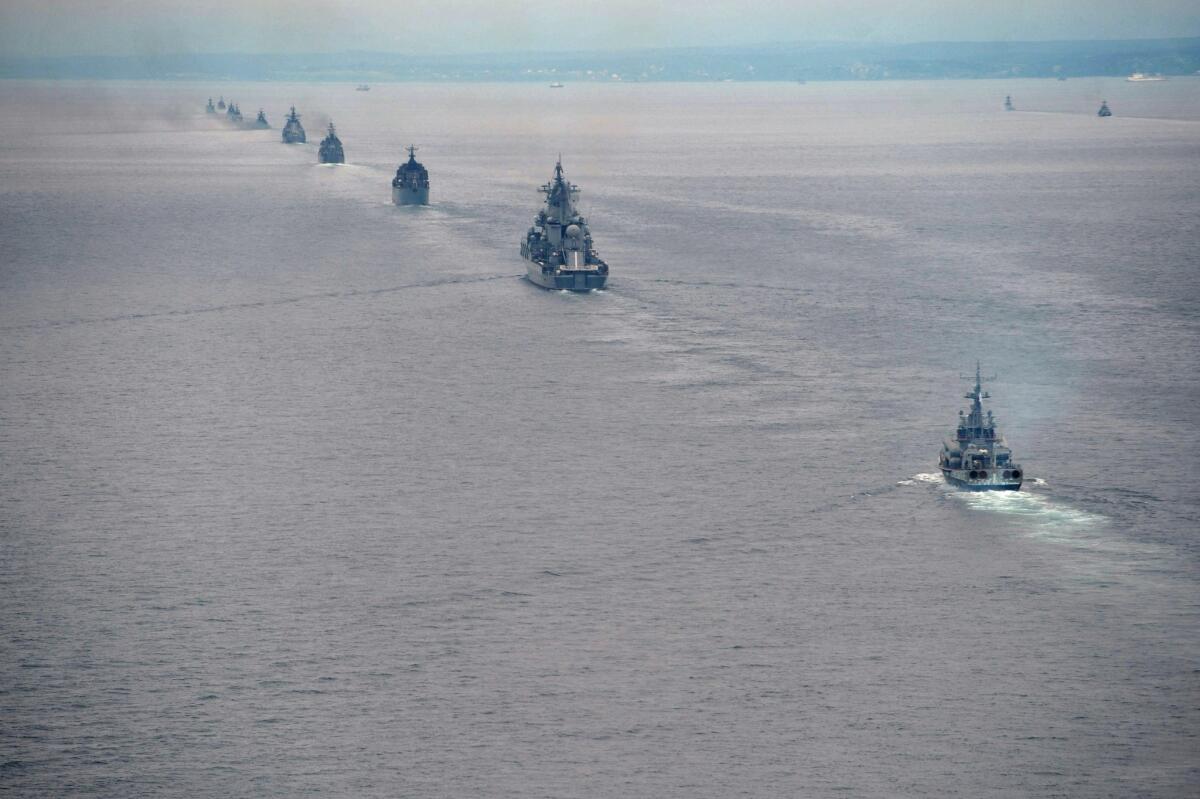NATO ministers to fine-tune readiness on Russian, Middle East threats

- Share via
NATO defense ministers gather Thursday in Brussels to decide key elements of their “Readiness Action Program” aimed at strengthening the alliance’s ability to respond to security challenges emanating from Russia, North Africa and the Middle East.
The military chiefs will determine the size and composition of the emerging rapid-reaction force that can be deployed in response to threats to the security of any of the alliance’s 28 member states, NATO spokeswoman Oana Lungescu said in a statement posted on the alliance website.
The meeting is the first opportunity for the defense chiefs of the North Atlantic Treaty Organization to evaluate progress toward creating the so-called spearhead force that can quickly respond to security challenges from a newly aggressive Russia or from Islamic militants south and east of the Mediterranean Sea.
NATO officials have accused the Kremlin of supplying arms and fighters to the pro-Russia separatists who occupy two large industrial regions of eastern Ukraine, involvement that Moscow denies in spite of satellite imagery showing Russian convoys entering Ukraine. The separatists have lately advanced toward a vital Sea of Azov port at Mariupol, which could deal a further blow to the Kiev government in its 10-month-old fight to hold the country together.
European security monitors in Ukraine have reported increasing movements of military vehicles from Russia into separatist-held Ukrainian territory. The reinforcements appeared to have helped the separatists seize the shattered Donetsk international airport last month after an eight-month battle that inflicted heavy casualties on both sides.
U.S. and European Union aid to Ukraine has so far been limited to nonlethal equipment and supplies, like food rations and night-vision goggles. But as Russia is seen to be boosting its support for the separatists, some influential U.S. security figures have called on the Obama administration to provide Ukraine with the weapons it needs to defend itself.
Ashton Carter, the administration’s nominee to succeed Defense Secretary Chuck Hagel, said during his Senate confirmation hearing Wednesday that he was “very much inclined” to provide lethal assistance to Ukraine.
Other NATO states, including Germany, have opposed sending more weaponry into the Ukrainian conflict, which has taken more than 5,300 lives since April. German Chancellor Angela Merkel has called instead for more pressure on the combatants to negotiate an end to the war.
NATO aid to Ukraine wasn’t mentioned by Lungescu in her outlining of the defense ministers’ agenda but seemed likely to come up, at least during the two news conferences that alliance chief Jens Stoltenberg has scheduled Thursday.
Whether it is addressed by the NATO ministers, Russia is expected to be angered by any moves to bolster embattled Ukraine’s armed forces. The Kremlin seized Ukraine’s Crimean peninsula nearly a year ago, within days of the Feb. 21 ouster of its loyal ally Viktor Yanukovich from the Ukrainian presidency.
Yanukovich was driven out by a rebellion sparked by his attempt to block Ukraine’s pursuit of alliance with the European Union and eventually NATO. That political shift westward is vehemently opposed by Russian President Vladimir Putin, who sees former Soviet states as within Russia’s traditional sphere of influence.
The NATO meeting will include Defense Minister Mindia Janelidze of Georgia, another former Soviet republic that the Kremlin wants to prevent from becoming a NATO member.
The spearhead force was conceived and authorized by alliance leaders at their summit in Wales in September in response to calls from Poland and Baltic member states for improved defenses against potential threats from Russia.
An interim force of German, Norwegian and Dutch troops stands ready to respond to any security threat from the east, Stoltenberg told reporters in Berlin last month. A permanent force expected to number in the thousands is proposed to be in place next year.
Follow @cjwilliamslat for the latest international news 24/7
More to Read
Sign up for Essential California
The most important California stories and recommendations in your inbox every morning.
You may occasionally receive promotional content from the Los Angeles Times.














